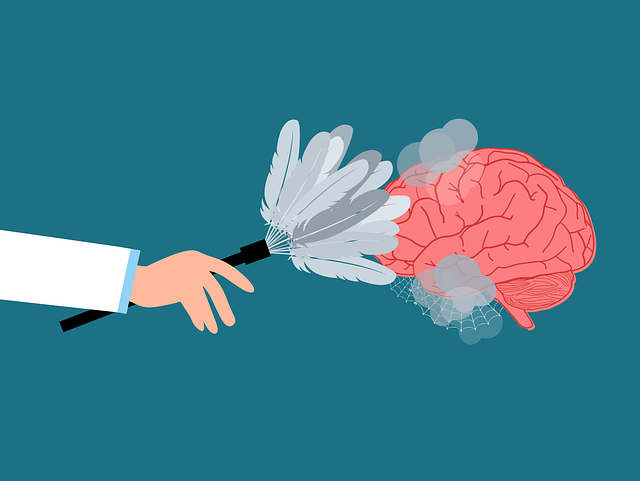Public awareness campaigns utilizing Arvada Cognitive Behavioral Therapy (CBT) techniques significantly enhance community mental well-being. By educating on stress management, anxiety, and depression, these campaigns empower individuals to take charge of their mental health. CBT's focus on thought patterns makes it effective for challenging stigma and promoting positive behaviors. Tailored campaigns target specific demographics, leveraging accessible services like social media and workshops. Success is measured through public attitude shifts, help-seeking increases, and therapist risk management, ensuring a transformative impact on community mental health.
Public awareness campaigns play a pivotal role in shaping societal attitudes and behaviors. This article delves into the development of such campaigns, focusing on the transformative potential of Arvada Cognitive Behavioral Therapy (CBT). We explore strategies for designing effective CBT-based awareness initiatives, emphasizing target audience identification as a cornerstone of success. Additionally, we present evaluation metrics to measure campaign impact, ensuring efforts align with achieving positive mental health outcomes.
- Understanding Public Awareness Campaigns: Their Role and Impact
- Arvada Cognitive Behavioral Therapy (CBT): Unlocking Mental Well-being
- Designing Effective CBT-Based Awareness Campaigns
- Target Audience Identification: A Cornerstone of Success
- Measuring Campaign Success: Evaluation Metrics for CBT Initiatives
Understanding Public Awareness Campaigns: Their Role and Impact

Public awareness campaigns play a pivotal role in educating and engaging communities on various issues, including mental health. These initiatives are designed to spread knowledge, challenge stigma, and encourage positive behaviors. In the context of Arvada Cognitive Behavioral Therapy (CBT), awareness campaigns can highlight the effectiveness of CBT techniques for managing stress, anxiety, and depression. By providing accessible information about self-care routine development and burnout prevention strategies, these campaigns empower individuals to take charge of their mental well-being.
In today’s fast-paced world, where work-life balance is often elusive for healthcare providers, awareness campaigns also focus on stress management techniques. They offer valuable insights into preventing professional burnout, ensuring that caregivers prioritize self-care alongside providing care to others. Through creative storytelling and engaging content, these initiatives can make complex mental health topics more understandable, encouraging early intervention and improved overall well-being within communities.
Arvada Cognitive Behavioral Therapy (CBT): Unlocking Mental Well-being

Arvada Cognitive Behavioral Therapy (CBT) is a powerful tool that has gained significant recognition in recent years. This therapeutic approach focuses on unlocking mental well-being by addressing negative thought patterns and behaviors. CBT helps individuals identify and challenge distorted thinking, replacing it with more realistic and positive thoughts, which can significantly improve mood and overall mental health. By combining talk therapy with practical techniques, such as mindfulness meditation, CBT empowers folks to take control of their lives and develop healthier coping mechanisms.
In the context of public awareness campaigns development, promoting CBT can be a game-changer. Educating the community about its benefits, especially in fostering positive thinking and improving mental health, can encourage people to seek help and support when needed. Integrating CBT techniques into these campaigns can empower individuals to navigate life’s challenges with resilience, enhancing overall well-being.
Designing Effective CBT-Based Awareness Campaigns

Public Awareness Campaigns Development leverages powerful tools like Arvada Cognitive Behavioral Therapy (CBT) to create impactful messages. CBT’s focus on identifying and changing negative thought patterns makes it ideal for addressing diverse societal issues, from mental health stigma to environmental concerns. By integrating self-awareness exercises into these campaigns, participants can better recognize and challenge unhelpful beliefs, fostering a more informed and empathetic public.
Effective CBT-based awareness initiatives also prioritize providing accessible trauma support services. This includes offering resources for processing difficult experiences and promoting resilience. Such an approach not only ensures that individuals leave the campaign with practical tools but also equips them to share their newfound knowledge with others in their communities, amplifying the reach and benefits of Public Awareness Campaigns Development.
Target Audience Identification: A Cornerstone of Success

Identifying the target audience is a foundational step in developing any effective public awareness campaign. In the context of Arvada Cognitive Behavioral Therapy (CBT) and related services, understanding the demographics, psychographics, and unique needs of the intended recipients is paramount. By recognizing whether one’s focus is on adolescents, adults, or specific communities, therapists and organizers can tailor their approach accordingly. This personalized strategy ensures that messages resonate deeply with the audience, fostering a stronger connection to the cause.
For instance, an Empathy Building Strategies campaign aimed at youth might leverage social media platforms popular among teens while incorporating engaging activities and peer mentors. In contrast, Trauma Support Services directed towards adults could utilize more formal channels like workshops, community gatherings, or partnerships with local businesses to create safe spaces for open dialogue and recovery-focused discussions. Such tailored initiatives not only capture the attention of the target audience but also empower individuals to take charge of their mental wellness through accessible Coaching Programs Development.
Measuring Campaign Success: Evaluation Metrics for CBT Initiatives

Measuring the success of a public awareness campaign focused on Arvada Cognitive Behavioral Therapy (CBT) involves careful evaluation using relevant metrics. These metrics should go beyond simple reach and engagement to capture the true impact of such initiatives. For CBT campaigns, it’s crucial to assess changes in public understanding and attitudes towards mental health, specifically focusing on reductions in stigma and increased help-seeking behaviors.
One way to achieve this is by employing surveys before and after the campaign to gauge knowledge and perceptions related to CBT and mental health generally. Additionally, tracking self-reported improvements in mental health and self-esteem can provide valuable insights into the campaign’s effect on individual well-being. Incorporating measures of cultural sensitivity in mental healthcare practice also ensures that the campaign resonates with diverse communities. Moreover, risk management planning for mental health professionals is an essential aspect to monitor, ensuring both the safety of practitioners and the quality of care delivered during and after the campaign.
Public awareness campaigns, particularly those centered around Arvada Cognitive Behavioral Therapy (CBT), play a pivotal role in enhancing mental well-being. By understanding their impact and employing effective design strategies, such as identifying the target audience and utilizing appropriate evaluation metrics, these campaigns can unlock significant benefits. Integrating CBT principles into public health initiatives ensures that more people have access to tools for managing mental health, fostering a more informed and resilient community.














